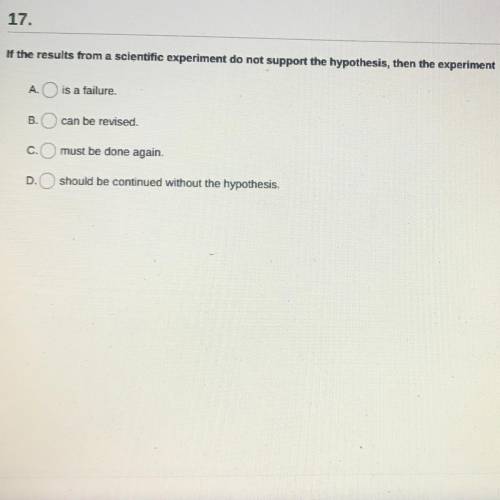
Biology, 20.05.2021 21:20, 21cassitsh
If the results from a scientific experiment do not support the hypothesis, then the experiment
A
is a failure.
B.
can be revised.
C.
must be done again.
D
should be continued without the hypothesis.


Answers: 2
Other questions on the subject: Biology

Biology, 22.06.2019 05:30, Will1119
Can bacteria reproduce in a way such that when you start out with two bacteria, you get five bacteria? why or why not? * a. yes, because bacteria reproduce sexually, and can produce any number of offspring, just as humans do. b. no, because bacteria grow at an exponential rate. c. no, because when bacteria reproduce, they split into two parts, and two bacteria splitting would result in four bacteria.
Answers: 1

Biology, 22.06.2019 10:30, Xavitheking2542
In order to study genetic mutations, scientists must study genetic material. which statement describes the genetic material scientists are most likely studying? a) they study alleles that contain chromosomes, which are rna. b) they study alleles that contain genes, which are chromosomes. c) they study chromosomes that contain genes, which are dna segments.
Answers: 1

Biology, 22.06.2019 16:30, moneykey
Urgent in guinea pigs, black fur (b) is dominant over white fur (b). cross a heterozygous (hybrid) black guinea pig with a homozygous (purebred) white guinea pig. complete a punnett square, identify the genotype(s), phenotype(s), and probability (% and fraction) that the offspring will be black and white?
Answers: 1

Biology, 22.06.2019 17:00, maleja2038
Some species of wasps are social. the queen starts a colony from scratch each spring. she builds a small nest, and lays and raises a group of female workers. the workers enlarge the nest while the queen continues to lay eggs. unfertilized eggs become males that mate with newly hatched females. all of the wasps except the newly fertilized females die by the summer. which best describes this behavior? a)it is beneficial only to the males that do not fertilize eggs. b)it is beneficial only to the female workers that are not fertilized. c)it is beneficial to each one of the individual colony members. d)it is beneficial to the whole species, but not to all of the individual members.
Answers: 1
Do you know the correct answer?
If the results from a scientific experiment do not support the hypothesis, then the experiment
A
Questions in other subjects:

Social Studies, 11.07.2021 15:50

Health, 11.07.2021 15:50

Arts, 11.07.2021 15:50

Social Studies, 11.07.2021 15:50

English, 11.07.2021 16:10

Mathematics, 11.07.2021 16:10


Mathematics, 11.07.2021 16:10








